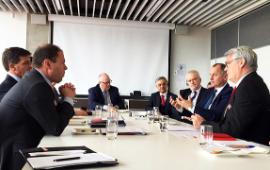The future of smart cities

In Summary
- Minister for Environment and Energy Josh Frydenberg visited Swinburne with Assistant Minister for Cities and Digital Transformation Angus Taylor to discuss the future of smart cities
Swinburne researchers have joined forces with the Federal government to help determine the future of Smart Cities in Australia after Minister for Environment and Energy, Josh Frydenberg, toured the University’s newly-launched Smart Cities Research Institute.
Mr Frydenberg joined Assistant Minister for Cities and Digital Transformation, Angus Taylor, in the tour and took part in a discussion with Institute leaders on how best to implement a framework for a Smart Cities future.
Institute Director Professor Mark Burry, and Deputy Vice-Chancellor (Research), Professor Aleksander Subic, met with the pair to discuss the aims of the Institute and the role smart cities will play in Australia’s future.
Professor Burry said the goals of the Institute were closely aligned with the policy directions of the Federal Government.
“We spoke of a vision for every Australian to contribute towards innovative and compelling urban design and management decisions that directly influence the built environment we all inhabit,” Professor Burry said.
“A shared goal discussed was the development and testing of a practical framework that supports the exploration of options for vibrant city living, extending two generations into the future.”
Professor Burry said the ability to realistically visualise liveability scenarios for up to five decades forward was discussed as an important ambition of the Institute.
He also said the use of games technology and smartphones could be used to determine the future needs of a society and needs of individuals.
On his website, Mr Frydenberg said he was impressed with the work of the Institute and its plans to help make cities more liveable and sustainable.
He said welcomed the Institute’s vision and plan to tackle head-on the challenges faced by cities into the future and its proposal collaboration with industry, business, the community and planners.
“A smart city is one that utilises information and communication technology to provide innovative and efficient services,” he said.
“A smart city raises the standard of living for all while promoting sustainability and reducing human impact on the environment.
“Most of all a smart city introduces fresh opportunities for citizens to participate in the design decisions about the urban environment that directly affects them.”

